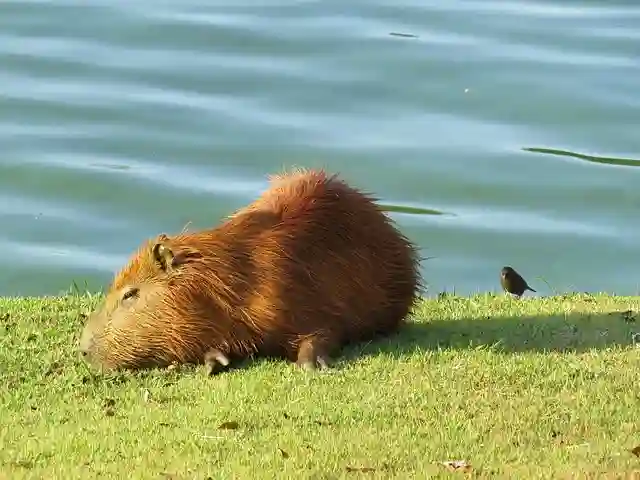Once a person who just got a capybara asked me ‘Why is my capybara sad?’ Being a capybara owner, I understand the importance of recognizing and addressing a capybara’s emotional state.
Seeing a sad capybara can be concerning, as we want our beloved pets to be happy and content.
By identifying the possible reasons behind their sadness, we can take steps to improve their emotional well-being and create a supportive environment.
Now, let’s address the question ‘Why is my capybara sad?’ and what you can do to make them happy.
Contents
Why is My Capybara Sad
Factors such as loneliness, lack of social interaction, changes in their environment, illness, or stress can contribute to a sad capybara.
Capybaras, like humans, experience emotions, and it is essential to understand why they might be feeling down.
Observing their behavior, seeking companionship, and providing mental and physical stimulation can go a long way in helping our capybaras lead happier lives.
Are Capybaras Dangerous to Humans – My Experience
To know the reason behind a sad capybara, we need to know their behavior.
Understanding Capybaras Behavior to know the Reason behind a Sad Capybara
Capybaras are highly social animals, naturally living in groups. They thrive on social interactions with their kind and other compatible animals, displaying a friendly and amiable nature.
They communicate through a variety of methods, including vocalizations, body language, and scent marking.
Signs of a happy capybara include playful behavior, contentment, and relaxed posture. They often enjoy grooming sessions and engaging in group activities.
Capybara Dental Care, Capybara Teeth Size, Bite Force – Everything You Need to Know
It’s important to provide them with suitable companionship and opportunities for socialization to prevent loneliness and promote their happiness.
Observing and appreciating their natural behavior can help us identify any potential signs of sadness and take appropriate measures to ensure their well-being.
Signs of a Sad Capybara

Based on my personal experience as a capybara owner, I have noticed certain behavioral and physical signs that may indicate a capybara is feeling sad.
Here are the key points:
- Decreased Appetite: A sad capybara may show a lack of interest in eating, resulting in a noticeable decrease in appetite.
- Lethargy: They may exhibit low energy levels, appearing more sluggish and less active than usual.
- Withdrawal: A sad capybara may isolate themselves or withdraw from social interactions with humans or other capybaras.
- Changes in Social Interactions: They may display a reduced desire to engage in social activities with companions, showing disinterest or avoiding interactions.
Can Your Capybara Get Rabies – 6 Symptoms, Prevention, Treatment
It is essential to observe these signs in conjunction with their usual behavior patterns and take into account any recent changes in their environment or routine.
If you notice consistent signs of sadness in your capybara, it is advisable to consult with a veterinarian who specializes in exotic animals. They can provide a professional assessment and guidance on how to address your capybara’s emotional well-being.
Remember, a caring and attentive approach can help improve their happiness and overall quality of life.
Reasons of a Sad Capybara – Why is my Capybara Sad
As a capybara owner, I understand the concern of seeing a sad capybara. Several factors could contribute to a capybara’s sadness, and it’s important to address them to improve their well-being. Here are some potential reasons for a capybara’s sadness:
- Loneliness: Capybaras are highly social animals and thrive in the company of other capybaras or suitable companions. Being alone for extended periods can lead to sadness.
- Lack of Social Interaction: Insufficient social interaction with humans or other capybaras can make them feel isolated and contribute to their sadness.
- Changes in the Environment: Capybaras are creatures of habit and may become sad when their environment undergoes significant changes, such as relocation or alterations in their living space.
- Illness or Pain: Like any living being, capybaras can experience physical discomfort or illness, which can manifest as sadness. It is important to monitor their health and seek veterinary assistance if necessary.
- Stress: High-stress situations or events, such as loud noises, overcrowding, or disruptions in routine, can impact a capybara’s emotional well-being and make them feel sad.
How to Take Care of a Capybara Pet?
To address a sad capybara’s emotions, it’s crucial to provide them with the following:
- Suitable Social Interaction: Ensure they have opportunities to interact with other capybaras or species-appropriate companions to fulfill their social needs.
- Enrichment Activities: Engage them in stimulating activities like puzzles, toys, or exploring new environments to combat boredom and enhance mental well-being.
- Consistent and Comforting Environment: Maintain a stable and safe environment, including familiar hiding spots, clean living areas, and access to fresh water.
If a capybara’s sadness persists or if there are concerns about their health, consulting with a veterinarian experienced in capybara care is essential.
They can provide further insights, diagnose any underlying issues, and recommend appropriate interventions to improve the capybara’s emotional well-being.
How to Make a Sad Capybara Happy and Improve Capybara’s Emotional State
As a capybara owner, I understand the importance of improving a capybara’s emotional state when they seem sad. Here are some suggestions based on my own experience:
- Ensure Appropriate Social Interaction:
- Introduce your capybara to other capybaras or suitable companions for social interaction.
- Arrange playdates or outings with other capybara owners to provide opportunities for socializing.
- Provide Mental and Physical Stimulation:
- Engage your capybara in enrichment activities and provide toys that encourage mental and physical stimulation.
- Offer puzzle feeders, chew toys, and objects they can manipulate to keep them mentally and physically active.
- Create a Safe and Comfortable Environment:
- Ensure your capybara has adequate space to roam and explore, both indoors and outdoors if possible.
- Create hiding spots using boxes or tunnels where your capybara can retreat when they desire privacy or a sense of security.
- Provide access to clean, freshwater sources, such as a shallow pool or large water bowl, as capybaras are semi-aquatic creatures.
- Establish a Routine:
- Maintain a consistent daily routine that includes regular feeding times, playtime, and interaction with you and other companions.
- Capybaras thrive on routine, and a predictable schedule can provide a sense of stability and security.
- Monitor Their Health:
- Ensure your capybara receives regular veterinary check-ups to address any underlying health issues that could contribute to their sadness.
- Consult with a veterinarian experienced in capybara care for guidance on their emotional well-being.
By implementing these suggestions, you can help improve your capybara’s emotional state. Remember, each capybara is unique, and it’s essential to observe and understand their individual needs and preferences.
Baby Capybara – Care, Diet, Lifespan, Size
Creating a supportive and enriching environment will go a long way in promoting a happier and healthier capybara companion.
Importance of Understanding their Well-being
Understanding the well-being of our capybaras is of utmost importance. Based on my own experience as a capybara owner, here are the key reasons why it matters:
- Emotional Health: Capybaras are social animals with complex emotions. Recognizing and addressing their sadness is essential for their overall happiness and quality of life.
- Behavioral Indicators: A sad capybara may exhibit changes in appetite, energy levels, or social interactions. Understanding these signs helps us identify and address their emotional well-being.
- Relationship Building: By understanding their well-being, we can strengthen our bond with our capybara, creating a trusting and nurturing environment for them.
- Early Intervention: Recognizing sadness early allows us to take proactive measures to improve their emotional state and prevent potential health issues.
- Responsible Ownership: As capybara owners, it is our responsibility to ensure the well-being of our pets. Understanding their emotions helps us meet their needs and provide a fulfilling life.
By prioritizing the understanding of our capybara’s well-being, we can promote their happiness, foster a harmonious relationship, and provide them with the care they deserve.
Consult a Veterinarian if your Capybara is still Sad
Based on my personal experience as a capybara owner, it is crucial to highlight the importance of consulting with a veterinarian if a capybara’s sadness persists or if there are concerns about their health.
Here are the key points:
- Veterinary Expertise: Veterinarians specializing in exotic animals, like capybaras, have the knowledge and experience to assess their emotional well-being and address any underlying health issues.
- Professional Evaluation: A veterinarian can conduct a thorough examination to determine the cause of a capybara’s sadness and develop an appropriate treatment plan.
- Emotional Support: Veterinarians can provide guidance on creating a supportive environment and implementing strategies to improve the capybara’s emotional state.
- Early Intervention: Consulting with a veterinarian at the first signs of sadness ensures prompt and appropriate intervention, maximizing the chances of restoring the capybara’s well-being.
Are Capybaras Dangerous – Do Capybaras Bite
By consulting with a veterinarian, we can ensure that our beloved capybaras receive the best possible care and support, both emotionally and physically.
They can provide invaluable advice and assistance in addressing any concerns and helping our capybaras thrive.
To Wrap Up
Now you must have got your answer to why is my capybara sad. As a capybara owner, it’s crucial to recognize and address a capybara’s sadness. Providing a supportive environment and social interactions are key. Watch for signs of a sad capybara, such as decreased appetite or withdrawal.
If concerns persist, seek professional help from a veterinarian. Their expertise can help determine the underlying cause and offer appropriate solutions.
Remember, a happy capybara requires attention to their emotional well-being. By creating a loving and stimulating environment, capybara owners can ensure the overall happiness and contentment of their beloved companions.

